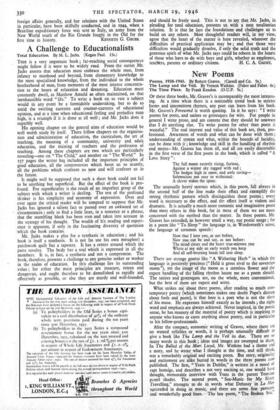A Challenge to Educationalists
Total Education. By M. L. Jacks. (Kegan Paul. 15s.) THIS is a very important book ; far-reaching social consequences might follow if it were to be widely read. From the outset Mr. Jacks asserts that education must embrace the whole man, from infancy to manhood and beyond, from elementary knowledge to the most specialised knowledge; from the individual to the whole brotherhood of man, from moments of the most intense concentra- tion to the hours of relaxation and dreaming. Education must constantly dwell, as Matthew Arnold so often maintained, on that inexhaustible word "life." To write a book on so vast a subject would in any event be a formidable undertaking, but to do so amid the swirling currents and counter-currents of educational opinion, and at a time when educational feeling and prejudice runs high, is a triumph if it is done at all well ; and Mr. Jacks does it superbly well.
His opening chapter on the general aims of education would be well worth study by itself. There follow chapters on the organisa- tion and administration of education, the curriculum, the art of teaching, the meaning of a community, university and adult education, and the training of teachers and the profession of teaching. Among these chapters are two which are particularly revealing—one on "The Child," and another on "The-World." In 157 pages the writer has included all the important principles of good education, all the controversies which beset us so acutely, all the problems which confront us now and will confront us in the future.
It might well be supposed that such a short book could not fail to be anything but superficial. But the effect of the book is pro- found. For superficiality is the result of an imperfect grasp of the subject with which a writer is dealing.. The test of the profound thinker is his simplicity and economy of expression. Over and over again the critical reader will be tempted to suppose that Mr. Jacks has ignored a salient fact or passed over an awkward set of circumstances ; only to find a little later, in a sentence or a phrase, that the stumbling block has been seen and taken into account in. the strategy of his thought. The wealth of his reading and experi- ence is apparent, if only in the fascinating diversity of quotation which the book contains.
Mr. Jacks makes a plea for a synthesis in education ; and his book is itself a synthesis. It is not (to use his own metaphor) a patchwork quilt but a tapestry. It has a centre around which the parts revolve. The body has a soul which is expressed in all the members. It is, in fact, a synthesis and not a compromise. The book, therefore, presents a challenge to any genuine seeker or worker in the realm of education. In this challenge lies its outstanding value ; for either the main principles are insecure, rotten and dangerous, and ought therefore to bbk demolished as rapidly and effectively as possible, or else they are sturdy and well-founded, and should be freely used. This is not to say that Mr. Jacks, in pleading for total education, presents us with a neat totalitarian solution. It is that he lays the foundations and challenges us to build on any others. Most thoughtful readers will, in my view, agree that the heart of the matter is here revealed, whatever the difficulties of practical application may be • and that those very difficulties would gradually dissolve, if only ihe solid truth and the generous spirit of what Mr. Jacks says could be reborn in the hearts of those who have to do with boys and girls, whether as employers,
teachers, parents or ordinary citizens. E. C. A. GAUNT.


























 Previous page
Previous page